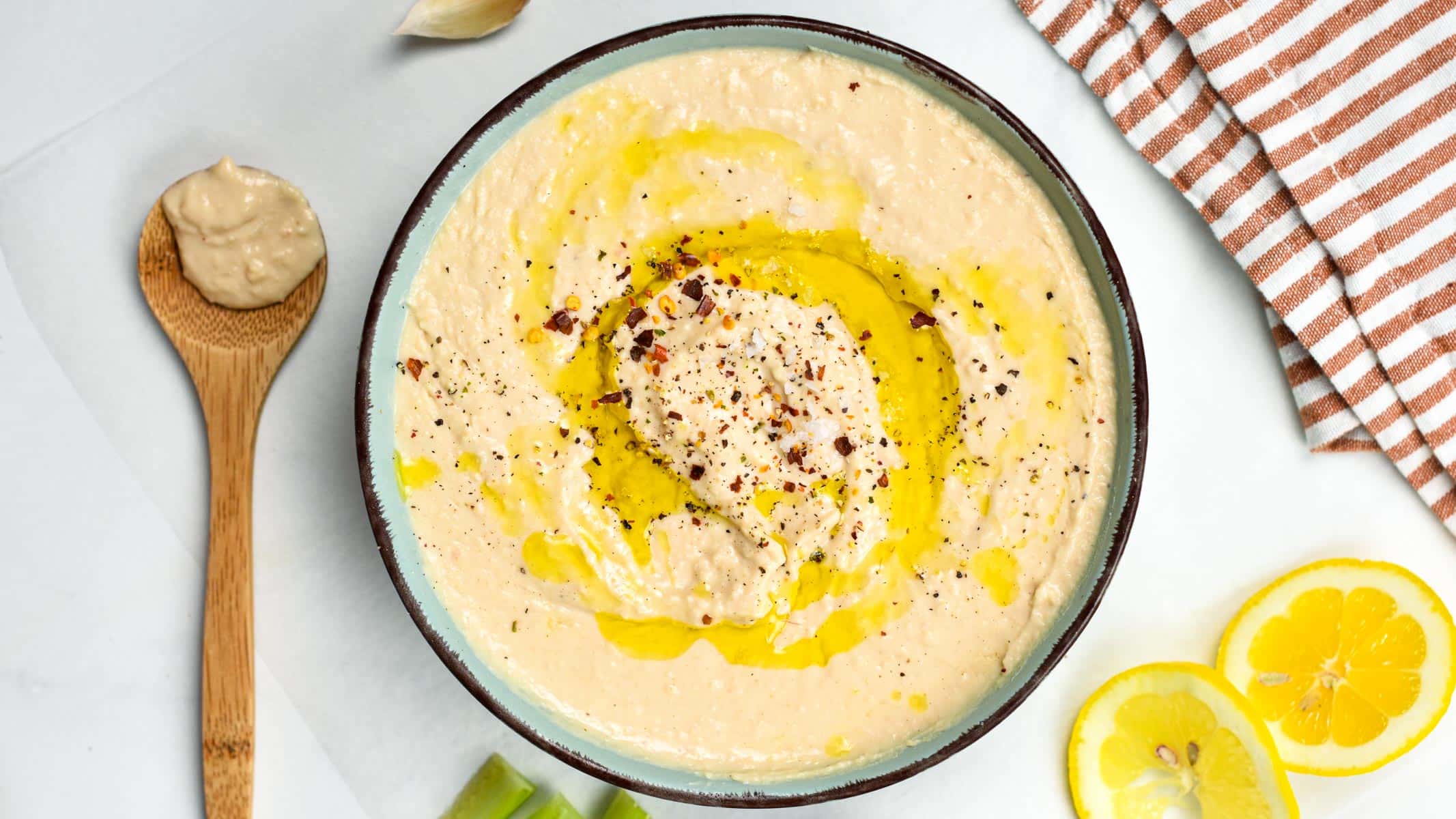Hummus is a delicious Middle Eastern spread, made primarily from chickpeas. It has gained a global following for its creamy texture, rich flavor, and versatility. But is hummus genuinely vegan? In this article, we delve into the components of hummus and its production process to determine whether it aligns with the principles of a vegan lifestyle.

Homemade Hummus: Chickpeas and Olive Oil
At its core, hummus is crafted from a blend of chickpeas (garbanzo beans), tahini (sesame seed paste), olive oil, lemon juice, and various spices.
Chickpeas, a staple of plant-based diets, are a nutritional powerhouse, rich in protein, fiber, vitamins, and minerals.
They serve as the primary ingredient in hummus, offering a solid foundation for its vegan status.
Olive oil, another key component, provides a creamy texture and a subtle depth of flavor. Not only is olive oil free from animal-derived ingredients, but it’s also celebrated for its numerous health benefits, contributing to a balanced vegan diet.
Tahini – A Vegan Bind
Tahini, derived from ground sesame seeds, plays a pivotal role in hummus. This nutty paste not only enhances the taste but also contributes to the dip’s luxurious consistency.
Tahini is undeniably vegan, making it a safe choice for those adhering to plant-based diets. In fact, it adds a dose of healthy fats, vitamins, and minerals to the dish, complementing the nutrient profile of chickpeas.
Flavor Enhancements – Vegan-Friendly Herbs and Spices
To improve the taste of hummus, a medley of herbs and spices is often incorporated. Classic additions like garlic, cumin, and paprika infuse hummus with its characteristic savory profile.
These flavorings are entirely plant-based, aligning seamlessly with vegan dietary principles.
The Question of Commercial Hummus
While homemade hummus tends to be inherently vegan, the story can change with store-bought options.
Many commercial brands offer an array of hummus varieties, some of which might contain non-vegan additives such as dairy-based flavorings, honey, or even animal-derived enzymes for texture enhancement.
Therefore, vigilant label reading is imperative for those committed to a vegan lifestyle.
According to a study published in 2020 by the Plant Based Foods Association, the market for plant-based foods has shown consistent growth, with an increase of 27% over the previous year.
This trend highlights the growing demand for vegan products, including hummus.
To meet this demand, companies have been introducing vegan-certified hummus options, addressing the concerns of ethical and health-conscious consumers.
Hummus Alternatives
For those looking beyond traditional chickpea-based hummus, many vegan-friendly alternatives exist.
- Lentil-based hummus, for example, provides a twist on the classic recipe while maintaining a vegan status.
- Edamame hummus, crafted from soybeans, offers a unique flavor profile and added protein content.
- Roasted red pepper, spinach, or even beet-infused hummus varieties not only tantalize the taste buds but also contribute vibrant colors to the plate.
- White Bean Hummus provides the taste of hummus with the protein of white beans.
These alternatives showcase the adaptability of hummus and its potential to cater to various dietary preferences.
Conclusion
In conclusion, hummus can undoubtedly be considered a vegan treat when prepared with its fundamental ingredients – chickpeas, tahini, olive oil, herbs, and spices. Its wholesome nutritional profile, which includes protein, fiber, healthy fats, and an array of vitamins and minerals, makes it an appealing choice for those embracing plant-based diets.
However, vigilance is essential when opting for store-bought hummus, as non-vegan additives may sometimes find their way into commercial products.
As the demand for vegan options continues to rise, manufacturers are responding by producing certified vegan hummus to cater to this ever-growing market.
So, next time you scoop up a dollop of hummus with fresh veggies or pita bread, rest assured that you’re indulging in a vegan-friendly treat that not only delights the taste buds but also aligns with your ethical and dietary values.



Leave a comment